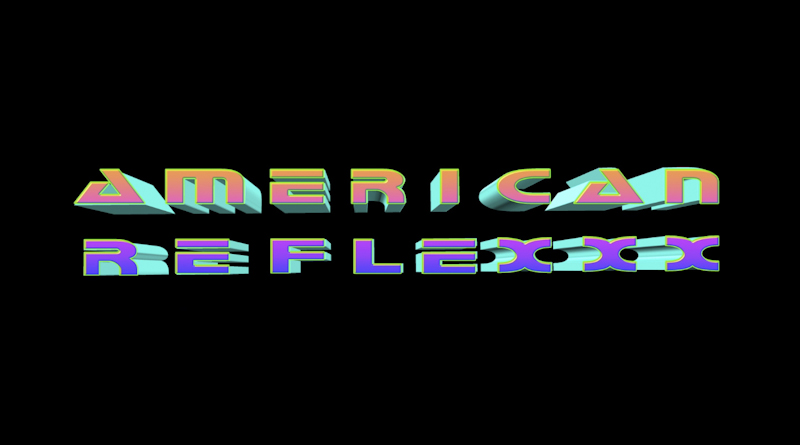
Signe Pierce and Alli Coates, American Reflexxx (2013)
Two years ago, performance artist Signe Pierce and videographer Alli Coates staged a public intervention on the Myrtle Beach strip in South Carolina, a popular tourist spot. Concealing her face with a featureless mirrored mask, Pierce wore a tight blue mini dress and performed exaggerated, gyrating movements while walking through the streets at night through throngs of revelers. Coates did not intervene, instead passively recording the ensuing scene even as the safety of her partner was threatened. Earlier this year, the artists released a 14-minute "chopped and screwed" edit of the video on YouTube to an outpouring of public reaction. In the following conversation, Pierce discusses the work with writer and artist Alexis Anais Avedisian, Rhizome's spring Editorial Fellow.
I want to commend you for making a brave work that construes many related topics within current cyberfeminist discourses. To start, I felt your mirrored mask brought up parallels to privacy, in the sense that cultivated, crafted, and projected representations of the self are now rendered as trackable, malleable, and intended for public consumption. Feeling surveilled often intensifies our instinct to hide, yet every day we surrender our privacy to greater social, political, and economic forces.
Identity concealment poses a threatening question: is someone anonymous, possibly preconceived to be inauthentic, worthy of privacy? By putting on the mask, and claiming privacy through self-concealment, did your difference make you "less than human" in the eyes of the mob? As the "mob mentality" and its panic about your identity infringed upon your human rights, do you think that their fear was subconsciously related to a broader desire to be accessible and exposed on social media?
The nature of privacy during these still-early phases of the internet, and the notion of what's acceptable in terms of how we socially consume each other, is increasingly blurry. We've all been hanging out online for the past 8-10 years, and we've grown accustomed to feeling entitled to accessing other people's information. We watch each other on our various social media feeds as though we're TV, and in a sense, we are. We are the new TV. Through the scope of Facebook/Twitter/Snapchat/Instagram, our individual realities play out like TV shows. Our posts are little "episodes", and our likes, favs, and follower counts are essentially "ratings".
When I meet someone who doesn't have a Facebook or social media presence, a number of thoughts run through my mind:
Are they a luddite?
What do they know that I don't?
I wish I had the self-control and willpower to have authentic experiences without needing to broadcast my minutiae online.
I think by asking these questions, I get a sense of how the people reacting to me in American Reflexxx felt. Everyone was desperate to figure out why I would be doing something that they themselves wouldn't consider doing; because they can't see my face, they automatically assume that I'm hiding something.
Online identity is a strange condition, because even if we choose to broadcast our lives, it is just as easy to revert to anonymity when we're sitting behind our screens. You can exist online as an avatar or an anon, but to do it in real life reads as a threat. I think I instilled fear in people.
The fact that it required the mob to push me down and see my blood to know that I was "real" is terrifying, but I think one of the scariest aspects is that only one person dared to accuse my actions as possibly being "pretentious high art." No one else thought to consider asking if it was art, which reinforces why it we did it in the first place. Art needs to live and breathe in the places that need it the most.
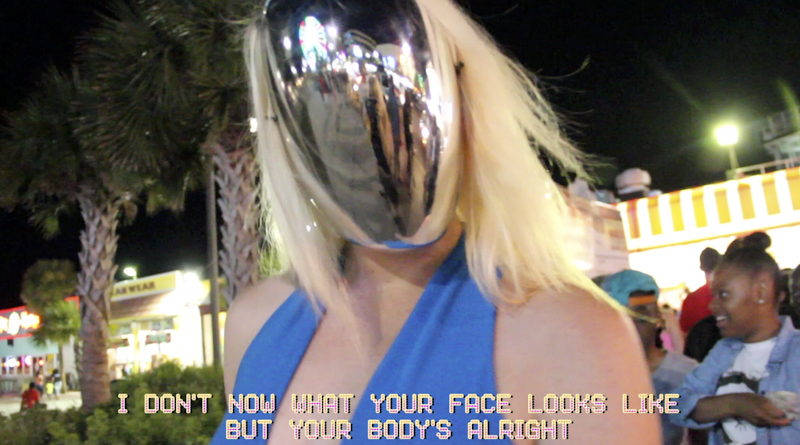
Signe Pierce and Alli Coates, American Reflexxx (2013)
Performing this work in public meant ceasing that kind self-control you mentioned through individual social media maintenance and catalyzing vulnerability within areas impossible to provide self defense. It's interesting here to think more about anonymity and invisible audiences in relation to internet harassment. We often feel like direct participants when we come across harmful threads or are made spectators to it in our newsfeeds. Negative interactions carry the potential to trigger very real emotional responses through associations to lived experiences, however direct or indirect the threat. Do you see the prevalence of internet harassment as a signifier of real-world oppressions, as harmful as it can be in physical reality?
Perpetuation of hate is rooted in people's subjective insecurities, with Reflexxx becoming a lived example. People were hurling bottles at my head and throwing slurs left and right on the streets. It went beyond bullying, it was assault.
We spent some time poring through the various message boards and comment threads to see what kinds of conversations it was spawning. The general outcry was one of love: we got a lot of positive feedback and encouragement from all over the world, but it was really interesting to read the boards fixated on hate. It did feel similar to the mob scene all over again, only yes, people had the opportunity to bash me anonymously, to claim the role of a shielded, mediated aggressor. In this way anonymity can be detrimental.
Hatred on the internet creates a feedback loop. Whenever you perform in public you're relinquishing control of the situation to the environment that surrounds you. To me, the beauty of American Reflexxx is that all of the moments that make it so unique (the preacher, the comments, the "push") are the unchoreographed realities of harassment. I find reality to be the most inspiring, terrifying medium.
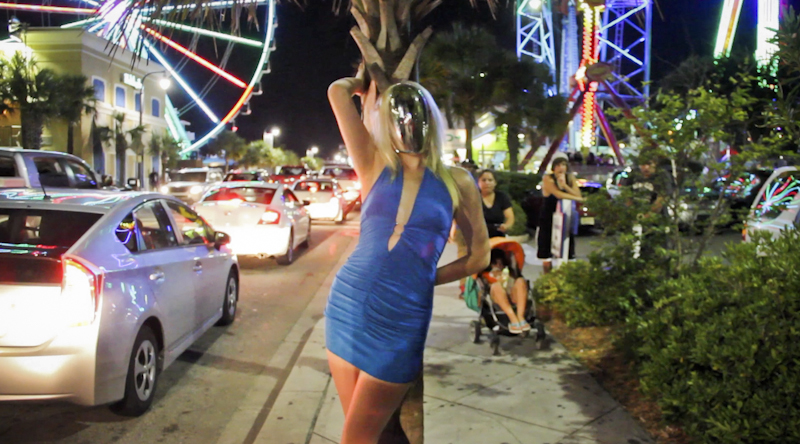
Signe Pierce and Alli Coates, American Reflexxx (2013)
You exhibited American Reflexxx in 2013, but waited some time before publishing it online. Were there any specific comment threads or reactions on YouTube that changed your relationship to the work, whether positive or negative?
We had debated the best way to handle its distribution, because we knew it was delicate material; there were a couple of different approaches we could have taken to its release. I think that waiting a year to put it online was overall a wise decision because our audience was much larger by the time it went up in April 2015, and the discourses that the film inspires have solidified more within the greater cultural zeitgeist.
More than anything, I've been motivated by all of the messages we've received from people telling us how much the performance meant to them. There are people who see the girl in the mirrored mask as a symbol for the oppression and hatred they've had to endure for being who they are. It's inspired me to think more about the ways that art can help others and how our work can serve to fuel conversations that need to be had.
At one point in the video, a voice emerges in a crowd of black teenagers — an urge not to "get arrested for the blonde girl" — alluding to extremely real phobias regarding race and sanctions of authority. Having made this work within the context of the American south, can you describe the importance of including instances of racial prejudice as a form of activism? How do these instances help to raise awareness about racial realities, in the wake of recent, horrific events?
To be completely honest, we don't know whose voice is saying that specific line. Her voice comes from off camera, and we also don't know who she's speaking to. I've always thought that comment spoke more towards the nature of men needing to be reminded not to view women as objects. It's "don't harass her so YOU don't get in trouble and go to jail…" not "don't harass her because she's a human being and not a sexual object who exists for your consumptive pleasure."
It's similar to the way that girls get sent home from high school for their shorts being too short. Rather than punishing and slut-shaming women, we should be educating men to stop viewing women as things to be consumed. We make up half of the population — we exist and have feelings and are entitled to our personhood. Dehumanization towards women happens every day, not just when we're provocatively dressed wearing a mask on the streets in an attempt to prove a point.
With regard to your original question, I'm a firm advocate of the power that we have as camera-carrying citizens in the promotion of unveiling civil injustices. This era is unlike any other: never before has the general population of a 1st-world country collectively carried cameras on their person. It's exciting and I think it comes with a responsibility to document and record injustices, to be aware and to speak up against police brutality.
Although the events that transpire in American Reflexxx are real and unstaged, what happened to me that night is not indicative of my own reality. I don't walk down the street every single day in a mask and stripper heels, I was wearing a costume and playing a character. The inherent privilege that I have as a biological white woman performing a provocative act like this is not lost on me. If I had been a trans woman of color performing this exact same piece, things almost certainly would've ended with even harsher consequences, possibly even fatality. To me, this is an important aspect in the aftermath of the performance and the conversations that surround it.
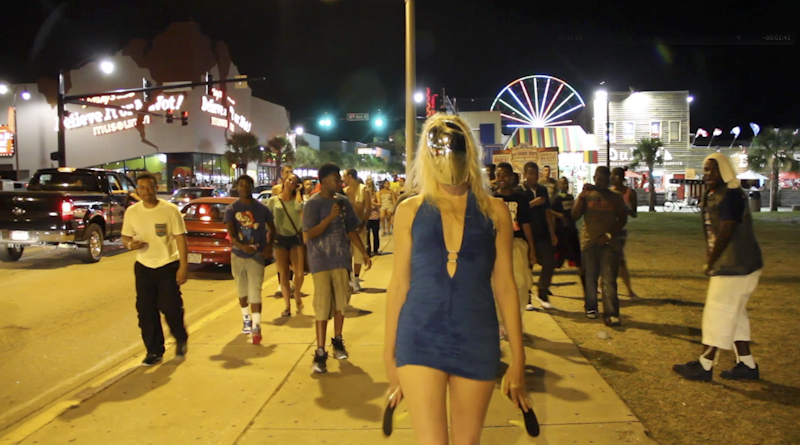
Signe Pierce and Alli Coates, American Reflexxx (2013)
There was speculation that you were being paid for the performance, which simultaneously reduced your activism to that of sex work and pornography. People questioning whether or not you were being paid might have been an attempt to find common ground, as if commodification is justifiable and relatable. However, as you mentioned, I do think your whiteness and projected heterosexuality became problematic because it reinforced an assumption that a cis white female body is more likely to produce a hetero-male valued commodity, in turn, producing a hetero male-specific "hero" fantasy that necessitates masculine protection and not fatal violence. We saw the most abject form of this in Charlestown, and it's important to note that the the "push" came from another white, cis woman, possibly subconsciously threatened by your ability to solicit male attention.
Throughout, men claimed their own emotional responses to an objectified female body as innately more important than a woman's individuality or independence. You identify your work as cyberfeminist, comparing your portrayed character to Donna Haraway's Cyborg Manifesto. But Haraway's cyborg renders as impersonal, a sort of throwback to an era when understanding and experiencing sentience within digital contexts was still unforeseen. How does early cyberfeminism continue to inform your practice, in light of current discourses on commodification, gender, and the more emotional connotations of social media?
I'm always inspired by reading about burgeoning concepts of identity in posthumanism before technology and the internet really hit. I love science fiction for this reason. Cyborg Manifesto was prophetic in its ability to succinctly describe an ideology that I and many of my friends relate to 30 years after it was written.
I am personally interested in the ways that women, or anyone who doesn't fit into the white male-driven patriarchy, for that matter, have been able to assert their voices in the age of the internet. We've been able to carve out our own hive where we can exchange ideas and aesthetics without being censored or discouraged by the powers that be. Everyone has an equal opportunity to take the mic, and it's creating a lot of necessary discourse about sexuality, race, class, etc.. There's still a lot of work to do, and perhaps I live in a bubble where I'm surrounded by progressive people, but I feel like feminism has come a long way in the past 5-10 years, and I think it's due much in part to the internet and the emotional relationships we build.
I'm curious as to what's next in terms of how we talk about and address gender. We immediately assign and assume people as male & female and, in a transgender world, the concept feels increasingly dated, binary, and exclusive.
It's becoming almost ironic to consider freedom of speech as a bedrock of America, when mainstream news reporting is still so fundamentally jaded and lacking in sincere brevity when compared with citizen-reporting. The reality experiment of American Reflexxx allowed for opinions to manifest themselves live, but the hate that ensued was much more evident of mainstream social conditioning, showing a definitive reluctance to adapt to more progressive ideologies.
Americans are supposedly taught to value individuality, but exhibiting difference proved to be dangerous in your work. As artists who "didn't intend to make a work about dehumanization, how does "being different" or even "being yourself" challenge American ideals of free speech?
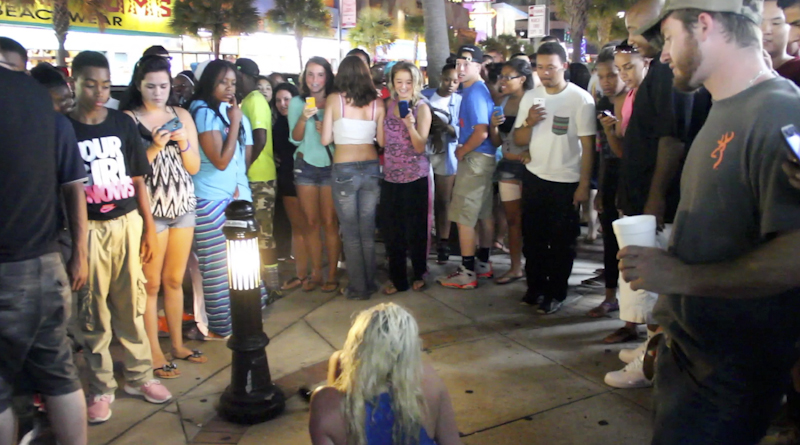
Signe Pierce and Alli Coates, American Reflexxx (2013)
I honestly would not say that Americans are taught to value individuality, and that's a sad plight. The notion of the first amendment is one that would appear to commemorate freedom, but it often serves the opposite. It seems that freedom of speech is defended as a means of oppression, as evident in people fighting for their right to use hate speech or to wave the confederate flag. Being different is radical, and it absolutely challenges American ideals. It's pretty absurd that a media circus is prone to break out anytime someone in the public eye comes out as gay or identifies as trans.
My personal reaction to re-watching American Reflexxx is that the audience is trying very hard to seem cool to one another. In that situation, everyone knew that they were not the weakest link or the weirdest person present, and thus they were granted the power of commonality, one that they could all bond over. They're all walking and talking with this corny, affected braggadocio and being loud to make sure that everyone can hear how tough and funny they are when they're making fun of me. It's pretty clear though that they were terrified because they knew I knew something that they didn't. A lot of kids and teens have written us to say that it reminds them of their experiences at school. People fear and hate what they don't understand.
It starts and ends with education and tolerance. I know I'm preaching to the choir here, but it's true, and it's the biggest message we wanted people to take away from this film. They say that you should "never underestimate the kindness of strangers," and in response, I try to remember to "never forget your ability to be the kind stranger." It is our intention to prompt a reconsideration of how we treat each other, how we allow others to influence our own lives and behaviors, and how we have the right to flexxx some freedom of speech for good and not evil.
Follow Alexis on Twitter as @holyurl

